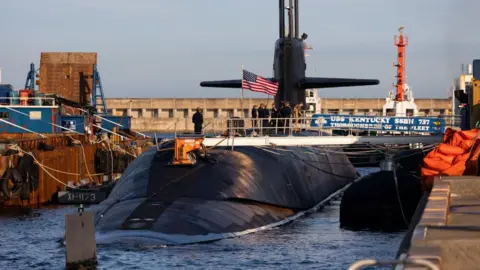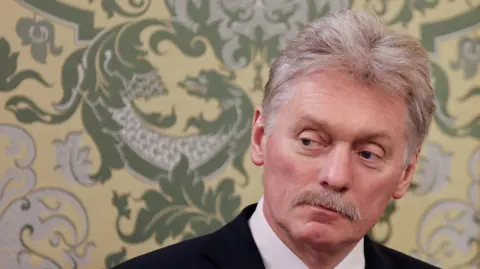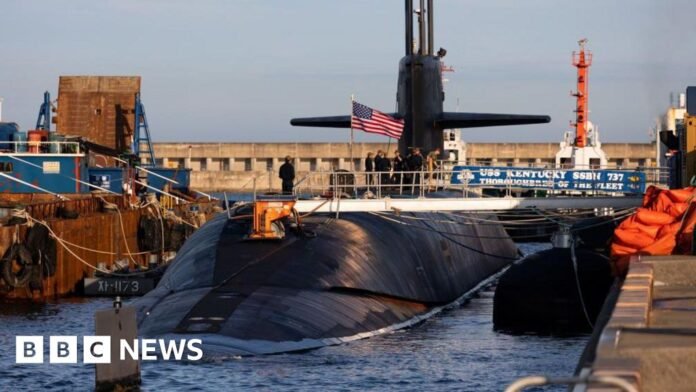 Bloomberg via Getty Images
Bloomberg via Getty ImagesThe Kremlin has played down Donald Trump’s orders to move two nuclear submarines closer to Russia, saying Moscow did not want to be involved in polemics.
In the first official reaction since the US president’s comments last Friday, Kremlin spokesman Dmitry Peskov said American submarines were on combat duty anyway and dismissed the idea that there had been an escalation.
“Very complex, very sensitive issues are being discussed, which, of course, many perceive very emotionally,” Peskov said – though he added that everyone should be “very cautious” with nuclear rhetoric.
US envoy Steve Witkoff is due to visit Russia on Wednesday, according to Russian media.
Last week, Trump ordered two nuclear submarines to “be positioned in the appropriate regions” in response to what he called “highly provocative” comments by former Russian President Dmitry Medvedev.
Trump did not say whether they were nuclear-powered or nuclear-armed submarines.
Medvedev – who in recent years has espoused increasingly extreme rhetoric online – had accused Trump of “playing the ultimatum game” with Russia after the US president set a new deadline for Vladimir Putin to end the war with Ukraine.
Without referencing the Medvedev spat directly, Peskov said on Monday that while “in every country members of the leadership… have different points of view”, Russian foreign policy was dictated by Putin alone.
Medvedev did not react to Trump’s response and has not been active on X since sending the offending post.
Relations between the US and Russia improved significantly after Trump took office in January – although in recent months the US president has signalled he suspects Putin may not be truly committed to ending the war in Ukraine, which began when Moscow launched its full-scale invasion in February 2022.
Now Trump has brought forward a deadline for Russia to reach a peace deal, threatening Moscow with severe tariffs targeting its oil and other exports if a ceasefire is not agreed by Friday 8 August.
Still, Washington and Moscow remain in contact and Peskov welcomed Witkoff’s trip later this week.
 Reuters
Reuters“We are always happy to see Mr Witkoff in Moscow… We consider such contact important, meaningful and useful,” he said, adding that Witkoff and Putin may meet.
Should a ceasefire not be reached by 8 August, Trump has said he would impose sanctions and secondary tariffs on Moscow to discourage other countries from trading with it.
But he has also admitted Russia – now the most sanctioned country in the world – was “pretty good at avoiding sanctions”.
Trump has also used unusually stern language to describe the Russian military, in a post on his social media platform, Truth Social.
Writing that he would “substantially” hike US tariffs on goods from India over its purchases of Russian oil, Trump accused India of not caring “how many people in Ukraine are being killed by the Russian War Machine”.
Three rounds of talks between Russian and Ukraine since the spring have failed to bring an end to the conflict any closer.
Only last week Putin reiterated that Russia’s main goal in the war was to “eradicate the reasons for the crisis in Ukraine and ensure Russia’s security”.
Moscow’s maximalist military and political preconditions for peace – including Ukraine becoming a neutral state, dramatically reducing its military and abandoning its Nato aspirations – remain unacceptable to Kyiv and to its Western partners.
On the frontlines and in Ukraine’s cities, the fighting and bloodshed continues.
Overnight Sunday into Monday, Russian strikes on the southern Zaporizhzhia region killed four people, while another died in Kherson. Last week a deadly Russian attack on Kyiv left at least 31 people dead and injured 159.
For its part Ukraine continues to target military objectives in Russia. On Monday it said it hit a Russian airbase in the occupied Crimea with drones, destroying one fighter jet and damaging others.





